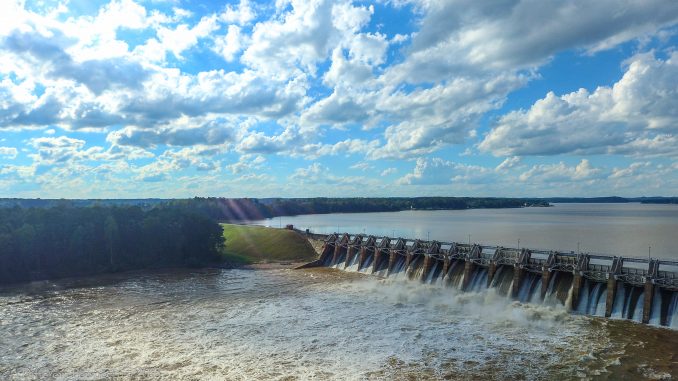
RALEIGH — North Carolina’s decade-long battle to control water from one of the state’s largest rivers and hydroelectricity that once powered a factory employing 1,000 is winding down after a federal appeals court rejected the state’s latest lawsuit.
The U.S. Court of Appeals for the District of Columbia Circuit rejected the state’s lawsuit last week trying to force the Federal Energy Regulatory Commission to reconsider licensing the Yadkin River dams until 2055. Laura Brewer, a spokeswoman for the attorney general’s office, said last week that state lawyers were considering next steps, including whether to continue appealing to the U.S. Supreme Court. The high court hears about 1 percent of appeals.
North Carolina’s top leaders have fought for the dams since 2009, when Alcoa Inc. announced it was closing its aluminum smelter that had been powered by the water-produced electricity for nearly a century.
Former Govs. Pat McCrory and Beverly Perdue as well as some state legislators fought renewing Alcoa’s license to operate the dams, arguing that the company shouldn’t be allowed to sell the power after the high-paying, blue-collar jobs left and the public received nothing for using its resources.
But N.C. officials could have sought the license during an open challenge period, now years passed, or they could have moved to condemn the four-dam project and paid Alcoa “just compensation,” Judge David B. Sentelle wrote in the decision. But that would have required mustering the political will and persuading the public the effort was worthwhile, he said.
“The fate of Badin Works was apparent to any competitor wishing to pursue the license,” Sentelle wrote for the Washington, D.C.-based court that hears challenges involving federal agencies. “The elephant in the room, as with many things in life, is money.”
North Carolina and any company that wanted to challenge Alcoa’s license renewal could have seen the signs of the Stanly County plant’s demise from earlier job cutbacks in 2002 and known that the smelter would no longer need all the electricity, Sentelle wrote. Alcoa disclosed to regulators that by 2006, 98 percent of the electricity was being sold on the wholesale power market rather than used for making aluminum near the town of Badin, about 50 miles east of Charlotte, Sentelle wrote for a three-judge panel.
“The loss of jobs from the closure of Badin Works is a dark and menacing cloud that hangs over the state of North Carolina. However, Alcoa did not conceal this impending squall, and thus, FERC did not err by denying North Carolina’s request to reopen licensing,” he wrote.
The U.S. Supreme Court last year refused to consider North Carolina’s claim, rejected by a lower appeals court, arguing that the state had an ownership interest in the four hydroelectric dams under the theory the state has owned the riverbed since U.S. independence in the 18th century.
Alcoa in 2017 completed its sale of the dams to Maryland-based Cube Yadkin Generation for about $243 million after taxes. Electricity sold to commercial customers generated more than $225 million in revenues in the past decade, and the value of the dams could increase with increasing demand for clean power.
Stanly County Journal staff contributed to this report.
